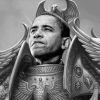- 18 Jun 2013 23:17
#14257005
What is this?
Rise of the Proletariat and far left elements who want to end the role of the Bourgeoisie in politics?
Venting of frustrations that will lead to the relatively left wing Brazilian government's fall to more conservative parties due to blowback?
The army's time to shine in the name of Fuutbol?
Or a temporary movement led by those smart enough to dislike the waste the Olympics et al megaevents usually involve, but who also won't go anywhere due to the influx of European money and the masses turning on them in the name of the spectacle?
PS: It's the last one.
Brazilian President Dilma Rousseff 'proud' of protests
Dilma Rousseff: "These people must be heard"
Continue reading the main story
Related Stories
Protests challenge Brazil's leaders
Student voices Watch
Brazil demonstrations turn violent
Brazilian President Dilma Rousseff has said she is proud of the tens of thousands of people who have taken to the streets to demand better education, schools and transport.
"My government is listening to the voices calling for change," said Ms Rousseff in her first comments since Monday night's protests.
The protests began with demands for bus fare hikes to be revoked.
They have turned into a nationwide demonstration against bad governance.
"Brazil has woken up a stronger country," said President Rousseff.
"The size of yesterday's marches is evidence of the strength of our democracy."
Continue reading the main story
“Start Quote
Many of the headlines in recent years about Brazilians have been about millions lifted out of poverty... But for many Brazilians the raised expectations do not seem to have been matched by results”
image of Gary Duffy Gary Duffy Executive editor, BBC Sao Paulo
Brazil's leaders caught out by mass protests
"It is good to see so many young people, and adults - the grandson, the father and the grandfather - together holding the Brazilian flag, singing our anthem and fighting for a better country," said Ms Rousseff.
She said her government had lifted "40 million people into the middle class" but more needed to be done to improve access to free health and education.
The demonstrations are Brazil's largest since 1992, when people took to the streets to demand the impeachment of President Fernando Collor de Mello.
Thousands of people gathered in front of Sao Paulo Cathedral on Tuesday for a new protest which was largely organised through social media. A demonstration was also taking place in the state of Rio de Janeiro.
Sao Paulo Mayor Fernando Haddad, was said to be heading for a meeting with President Rousseff, apparently to discuss options that would enable him to meet protesters' demands and cut public transport fares, says the BBC's Gary Duffy.
'It's really an honour to host the cup - but I don't think we have the conditions for it."
The mayors of Cuiaba, Recife, Joao Pessoa and other cities have announced a reduction in bus fares in response to Monday's protests.
A major rally is set to take place in Rio on Wednesday.
'Isolated violence'
The current wave of protests began earlier this month, with marches in Sao Paulo against a hike in the price of bus fares, from 3 reals ($1.40, £0.90) to 3.20.
They have been organised largely by young people through social media. The organisers called the movement Passe Livre (or Free Access).
Monday night saw the biggest demonstrations since the movement began.
In Brazil's largest city, Sao Paulo, about 65,000 people took to the streets.
The largest march was in Rio de Janeiro, where some 100,000 people marched peacefully through the city centre.
Towards the end of the evening in Rio, there were violent clashes between groups of protesters and police.
There were violent clashes overnight in Brasilia and Rio
The Rio de Janeiro state assembly was attacked, shops were vandalised and a car was set alight.
There were also isolated incidents in Sao Paulo, Brasilia, Porto Alegre and other cities.
"The isolated acts of violence, carried out by a minority, should be vigorously condemned," said Ms Rousseff.
The demonstrations gathered pace as Brazil hosts the Confederations Cup, a curtain-raiser event for next year's football World Cup.
Many complained of the huge amounts spent on construction for the World Cup and the 2016 Olympics, which will be hosted by Rio de Janeiro.
"We need better education, hospitals and security, not billions spent on the World Cup," said one mother who attended the Sao Paulo march with her daughter.
Deputy Sports Minister Luis Fernandes said the World Cup had provided an opportunity for the country to invest in infrastructure which will benefit everyone.
"There is widespread support in the Brazilian population for the World Cup and the Confederations Cup," said Mr Fernandes.
What is this?
Rise of the Proletariat and far left elements who want to end the role of the Bourgeoisie in politics?
Venting of frustrations that will lead to the relatively left wing Brazilian government's fall to more conservative parties due to blowback?
The army's time to shine in the name of Fuutbol?
Or a temporary movement led by those smart enough to dislike the waste the Olympics et al megaevents usually involve, but who also won't go anywhere due to the influx of European money and the masses turning on them in the name of the spectacle?
PS: It's the last one.
















 - By Potemkin
- By Potemkin - By Tainari88
- By Tainari88 - By wat0n
- By wat0n